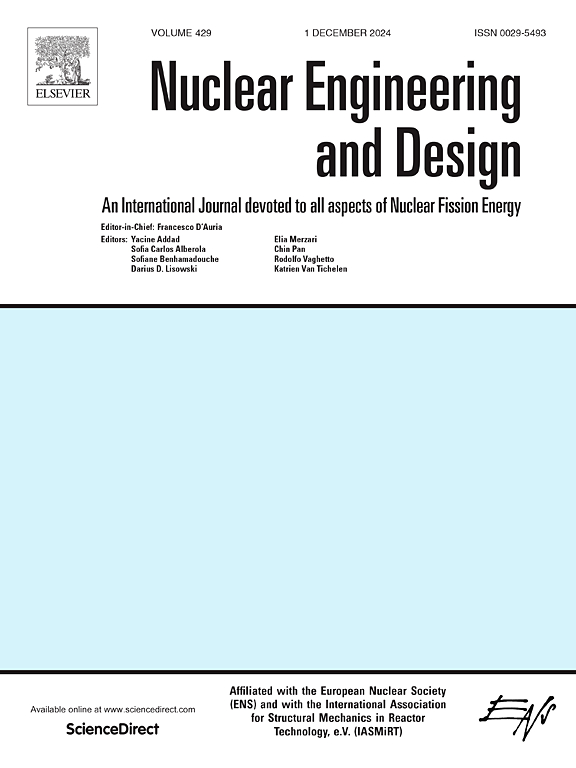The modified GOMS model based on CREAM in nuclear power plants of complex scenarios
IF 1.9
3区 工程技术
Q1 NUCLEAR SCIENCE & TECHNOLOGY
引用次数: 0
Abstract
This paper proposes a modified GOMS (Goals, Operators, Methods, and Selection Rules) model based on CREAM (cognitive reliability and error analysis method) to decompose the tasks in complex scenarios, and calculate the mental workload of operators in nuclear power plants. The modified GOMS model has two parts, one is the task analysis based on the basic GOMS and CREAM, and the other is the complex scenarios analysis based on Bayesian networks. The modified GOMS method decomposes the tasks using hierarchical task analysis (HTA), and gets the operators combining the cognitive activities from CREAM and the values from the Multiple Resources. The complex scenarios analysis uses the COCOM (contextual control model) from CREAM to analyze complex scenarios, and it considers the 2-Tuple linguistic to evaluate the CPCs when the operators execute the tasks. The approach gets the prior probabilities of complex scenarios and uses Bayesian networks to obtain the control modes impact factor (CMIF). It calculates the mental workload by the modified approach in complex scenarios. A case study uses the modified GOMS model to decompose the hot shutdown, and calculate the mental workload in nuclear power plants. It compares the HTA and the modified GOMS model with the results of NASA-TLX. It verifies the modified GOMS model’s corrective and effective.
核电厂复杂场景下基于CREAM的修正GOMS模型
本文提出了一种基于认知可靠性和误差分析方法(CREAM)的改进GOMS (Goals, Operators, Methods, and Selection Rules)模型,对复杂场景下的任务进行分解,并计算出核电站操作人员的心理工作量。改进的GOMS模型分为两部分,一是基于基本GOMS和CREAM的任务分析,二是基于贝叶斯网络的复杂场景分析。改进的GOMS方法利用分层任务分析(HTA)对任务进行分解,结合CREAM的认知活动和Multiple Resources的值得到算子。复杂场景分析使用来自CREAM的COCOM(上下文控制模型)来分析复杂场景,并考虑2-Tuple语言来评估操作员执行任务时的cpc。该方法获取复杂场景的先验概率,利用贝叶斯网络获得控制模式影响因子(CMIF)。通过改进后的方法计算复杂场景下的心理负荷。应用改进的GOMS模型对核电站热停堆进行分解,并计算了其心理负荷。将HTA和修正GOMS模型与NASA-TLX的结果进行了比较。验证了修正后的GOMS模型的正确性和有效性。
本文章由计算机程序翻译,如有差异,请以英文原文为准。
求助全文
约1分钟内获得全文
求助全文
来源期刊

Nuclear Engineering and Design
工程技术-核科学技术
CiteScore
3.40
自引率
11.80%
发文量
377
审稿时长
5 months
期刊介绍:
Nuclear Engineering and Design covers the wide range of disciplines involved in the engineering, design, safety and construction of nuclear fission reactors. The Editors welcome papers both on applied and innovative aspects and developments in nuclear science and technology.
Fundamentals of Reactor Design include:
• Thermal-Hydraulics and Core Physics
• Safety Analysis, Risk Assessment (PSA)
• Structural and Mechanical Engineering
• Materials Science
• Fuel Behavior and Design
• Structural Plant Design
• Engineering of Reactor Components
• Experiments
Aspects beyond fundamentals of Reactor Design covered:
• Accident Mitigation Measures
• Reactor Control Systems
• Licensing Issues
• Safeguard Engineering
• Economy of Plants
• Reprocessing / Waste Disposal
• Applications of Nuclear Energy
• Maintenance
• Decommissioning
Papers on new reactor ideas and developments (Generation IV reactors) such as inherently safe modular HTRs, High Performance LWRs/HWRs and LMFBs/GFR will be considered; Actinide Burners, Accelerator Driven Systems, Energy Amplifiers and other special designs of power and research reactors and their applications are also encouraged.
 求助内容:
求助内容: 应助结果提醒方式:
应助结果提醒方式:


